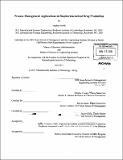Process management applications in biopharmaceutical drug production
Author(s)
Smith, Stephen E
DownloadFull printable version (6.261Mb)
Other Contributors
Leaders for Global Operations Program.
Advisor
Charles Cooney and Steven Spear.
Terms of use
Metadata
Show full item recordAbstract
Genzyme's manufacturing and supply chain organization is responsible for the production and delivery of medically necessary medicines for patients with rare diseases around the world. Because of the nature of the products produced at Genzyme, a lapse in operational performance has societal as well as economic impacts. Therefore increased understanding of the complex production systems at Genzyme is helpful to reduce risk and improve performance. This thesis is an analysis of a system of two critical production processes at Genzyme. These processes are studied collectively because shared resources make them a tightly coupled system. The research is presented in three sections. The first section explores the current state of the system and explains general performance trends. The second section examines the impact of scheduling complexity arising from shared resources. The third section discusses how process improvement methodologies could be applied at Genzyme. The following conclusions arise from the work conducted for this thesis. First, the performance of the system has declined due to an increase in utilization and an already high level of variability. Second, variability caused by shared resource conflicts can be minimized using new scheduling techniques. And finally, continuous improvement methods are recommended to further reduce variability and increase overall process performance.
Description
Thesis (M.B.A.)--Massachusetts Institute of Technology, Sloan School of Management; and, (S.M.)--Massachusetts Institute of Technology, Engineering Systems Division; in conjunction with the Leaders for Global Operations Program at MIT, 2011. Cataloged from PDF version of thesis. Includes bibliographical references (p. 71-73).
Date issued
2011Department
Leaders for Global Operations Program at MIT; Massachusetts Institute of Technology. Engineering Systems Division; Sloan School of ManagementPublisher
Massachusetts Institute of Technology
Keywords
Sloan School of Management., Engineering Systems Division., Leaders for Global Operations Program.